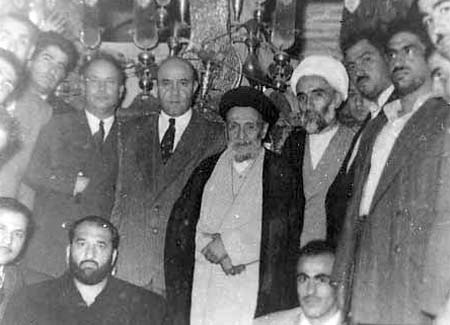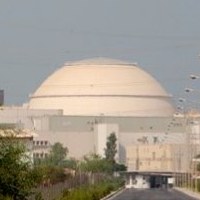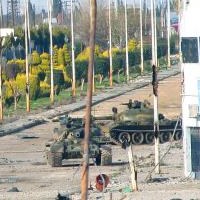![]()
Rubin Reports | By Barry Rubin
A different version of the following article was published in The Daily Caller.

Ayatollah Kashani (standing) and monarchist Shaban Jafari (Sitting), along with a band of Monarchists and Clerics. (source: iranpoliticsclub.net)
Presidential candidate Ron Paul has said repeatedly that Iranians hate America because of its role in the 1953 coup overthrowing Prime Minister Muhammad Mossadegh. Like his frequent claims that the September 11 attack was a response to a supposed decade-long U.S. bombing of Iraq.
In fact, about the only intense bombing of Iraq done by the United States in the last twenty years was for two weeks at the start of the 2003 war and one time in retaliation against an assassination plot against former president George Bush. From time to time, U.S. planes also hit Iraqi radar defenses, not likely as a source for the September 11 attacks. The picture that Paul’s statement implies is some sort of constant attack targeting Iraqi civilians.
But people know far less about the 1953 case, though it has long been a source of complaint by left-wing critics of U.S. foreign policy. I was the first scholar to see the U.S. government records for the crisis when writing my book, Paved with Good Intentions: The American Experience and Iran, in 1979. Here is a brief summary of the key points.
The nationalist government of Muhammad Mossadegh had nationalized the British oil company. While a well-intentioned democratic-minded modernizer, Mossadegh was also a personally erratic and incompetent prime minister. And the social base for parliamentary democracy in Iran was clearly not strong enough. In the face of a British embargo on Iran selling its oil — the British argued that it was “stolen property” — and many domestic problems, the country was spiraling into chaos. While the British were interested in getting the oil company back, the United States was worried about a Communist takeover. A group of pro-Shah Iranians teamed up with the British to propose a “counter-coup” in which the Shah would break openly with Mossadegh and the monarch’s supporters would overthrow the prime minister.
First, the pressure for the coup came from the British. The Truman Administration, which left in office in January 1953, opposed American involvement. However, the situation worsened and the Eisenhower Administration changed U.S. policy on the issue.
Mossadegh was an extremely unstable person and leader. He was clearly losing control of the country and the Communist Party, which backed him, was gaining power steadily. A close examination of the documents shows that whether it was correct or not U.S. fear of a Communist takeover was based on serious evidence. This was the midst of the Cold War and the USSR was Iran’s northern neighbor. The Soviets had occupied northern Iran from 1941 to 1946, to secure the country’s oil during World War Two, set up puppet regimes inside the country, and only withdrew under intensive U.S. pressure.
On balance, and after long consideration, I think the coup was a proper move for U.S. policy. One can say that it denied Iran a democratic regime but the way things were going, that was about to collapse into anarchy, a coup, or a Communist takeover anyway.
What is especially interesting in retrospect is that one of the main supporters of the move were the Iranian Muslim clerics, including Ayatollah Kashani, the man who would be a role model for Ayatollah Ruhollah Khomeini. I saw how he and his colleagues met with U.S. officials and urged a coup, since they also feared a Communist regime. It is ironic for Islamists to complain about a U.S. policy that they actively backed at the time.
Second, in legalistic terms the U.S. argument was that this was actually a “counter-coup” because the shah had the right to dismiss Mossadegh. The regime — as opposed to a particular prime minister — was not being overthrown by a coup but rather it was being saved from a coup by Mossadegh. This case is not rock-solid but has some standing. The situation was not like a Latin American military overthrowing a democratic government.
I have stated things here briefly and have not done justice to the complexity of the situation. A real argument can be mounted against U.S. policy at the time but in the end I don’t find it convincing and this is certainly not a case of an unjustified action aimed against someone because he was a liberal reformer or moderate nationalist.
But the most important point for today is the question of how this action reverberated over time: the Shah ruled for a quarter-century and basically did about as good a job as anyone was going to do there. He was a dictator, the regime had a high level of corruption, and the secret police used torture. Yet in many ways the succeeding regime has been even worse.
For U.S. policy, the two key questions were: did a better alternative exist and is a quarter-century success a failure because it comes to an end. I’d say a better alternative didn’t exist at the time and that if a policy works for 25 years that policy isn’t a failure.
As for the coming to power of a radical Islamist regime — as we are now seeing in countries like Egypt and Libya — that isn’t due to American backing for the previous ruler but to the nature of the societies involved.
All of this, however, only leads up to responding to Ron Paul’s claim. Liberal nationalist Iranians have blamed the United States for overthrowing Mossadegh, who after all was their leader. Yet these people have never been in power in Iran and only comprise a small portion of its population (though a larger portion of the exiled intelligentsia, the people who write book on the subject).
One of the very first acts of the Islamist regime—whose predecessors in the 1950s supported U.S. policy by the way—was to repress the followers of Mossadegh. Consequently, a country whose rulers supported a coup and then repressed the opponents of the coup can scarcely be said to hate America for supporting the coup.
There is one more point that doesn’t fit well with the currently hegemonic radical ideology expressed by the supporters of both Obama and Ron Paul but it must be included if one is ever going to understand Iran. Power is respected; weakness is not. In 1978 and 1979 the Carter Administration basically refused to support the Shah in the belief that this diffidence would win Iranian’s love. In fact it led to disaster.
The Clinton Administration in effect tried to do the opposite of what American policy had been in 1953. You can see the results for yourself. Many Iranians, especially those unhappy with the Islamist regime, believe that the United States put Khomeini in power the way that it returned the Shah to power a quarter-century earlier. In short, American power is exaggerated by Iranians who are either going to jump on the U.S. bandwagon or blame the United States no matter what happens.
Why is Ron Paul so much like Barack Obama on foreign policy? Because both men tend to blame America first and neither have a firm grasp of the realpolitik principles that must usually guide international policy. They also both overstate the role of things like popularity in global affairs.
In Paul’s case this makes him an isolationist, arguing that if the United States doesn’t bother other countries they will leave America alone.
In Obama’s case, he believes that America is bad for the world, mistakes America’s enemies as the good guys, and rejects U.S. interests in the belief that it is better to please other countries believing it will make them leave America alone.
They also have something else in common: they ignore or misunderstand the internal realities of other countries. The Islamist regime in Iran doesn’t hate America because of its past policy toward Iran but because it stands in the way of Tehran’s program: Islamist revolutions everywhere; the destruction not only of Israel but of virtually all regimes in the region; and their replacement by Iran-style governments and societies.
The issue — as with the USSR and the fascist states — is not hatred of either U.S. policies or freedom but the fact that America is a geopolitical enemy, making it harder or impossible for their radical ideology to conquer the world or at least their part of it.
For further reading on this issue, see:
Barry Rubin, Paved with Good Intentions: The American Experience and Iran, hardcover: Oxford University Press; paperback: Viking/Penguin. Published in Persian in Tehran as The War for Power in Iran.
“Regime Change and Iran: A Case Study,” Washington Quarterly, 2003, and published as “Lessons from Iran,” in Alexander T. J. Lennon and Camille Eiss, Reshaping Rogue States: Preemption, Regime Change, and U.S. Policy toward Iran, Iraq, and North Korea, (Boston, MIT Press, 2004), pp. 141-156.
Barry Rubin’s latest book, Israel: An Introduction, has just been published by Yale University Press.



 RSS
RSS










Response to Ron Paul: Did U.S. Policy Make Today’s Islamist Iran Hate America? http://t.co/K2PAmTVT
Response to Ron Paul: Did U.S. Policy Make Today’s Islamist Iran Hate America? http://t.co/K2PAmTVT